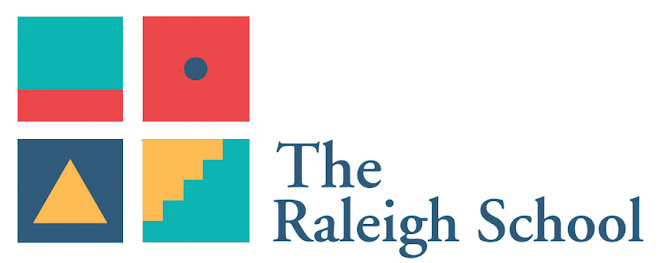Have you ever wondered what the symbols mean on The Raleigh School’s logo? I did! So I asked and I am so glad that I did. Historically there have been different interpretations. Here is what has been told to me and a few thoughts of my own.
Top Left Symbol – Rectangle below a square.
1.“Strong Foundation”
The Raleigh School is committed to helping children build a “strong foundation” of skills - academic, social and emotional. It is deeply important that children have many opportunities to practice and build those skills over and over.
But, ironically, skills alone are not enough to build a “strong foundation.” Children need a learning environment that encourages them to practice skills and build knowledge in a context that encourages meaning-making. Skills without understanding and meaning are not uselful. Most importantly, children need multiple opportunities to apply their new skills and knowledge in novel situations. The Raleigh School is committed to helping children build a “strong foundation” of skills - academic, social and emotional. It is deeply important that children have many opportunities to practice and build those skills over and over.
Howard Gardner, famed Harvard educator who reframed the notion of a single strand of intelligence, is eloquent on this topic. He discovered that while most of his Harvard students had lots of facts and knowledge, they had little ability to apply their skills and knowledge to new situation. Many schools only emphasize learning that requires memorizing as many facts as possible. At The Raleigh School, we believe that children should be asked to construct and use their knowledge to solve problems and confront new information every day.
2. "Guiding Each Child’s First Steps.”
First steps are important, even critical! I truly believe that the skills, values and habits of mind that children develop in their early years are critical for developing life-long learners. In fact, the sesearch is incontrovertible on this point.
First steps are important, even critical! I truly believe that the skills, values and habits of mind that children develop in their early years are critical for developing life-long learners. In fact, the sesearch is incontrovertible on this point.
If you listened to All Things Considered on August 12th, you probably heard a synopsis of Nobel Economist, James Hechman’s research that confirms what good preschool teachers have always known: early childhood education makes an enormous difference on later development. Children who go to preschools fair better on a whole variety of metrics later in life. Skills learned at ages 2,3, and 4 – learning how to problem solve and resolve conflict, to pay attention, to take turns, to take inititaive, - become the foundation for critical skills needed to be a successful adult.
Hechman says that if you want your child to have a good job at 21, then the most significant decision a parent can make is to send them to a good preschool. First Steps indeed!
Here's link to the NPR broadcast:

No comments:
Post a Comment